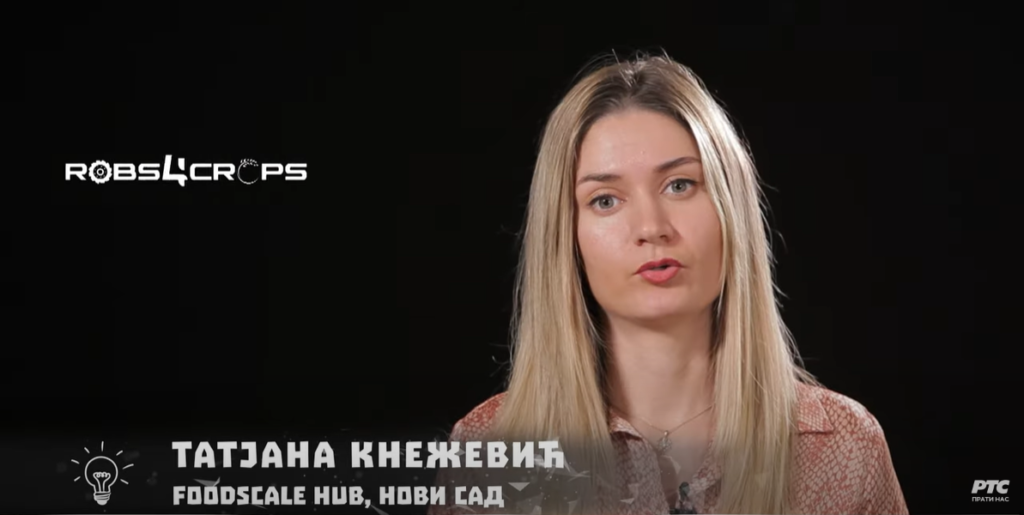European agriculture is facing rising labour costs and labour scarcity. COVID-19 has highlighted the urgent need for a solution to this problem. The EU funded project ROBS4CROPS aspires to deliver a labour-saving, fully autonomous robotic system for spraying and mechanical weeding, together with a supporting ecosystem, ready for wide-scale adoption. Featuring smart implements, autonomous vehicles, and high-level software for planning and scheduling, this innovative system will help farmers reduce labour requirements and reduce costs.
Latest updates - Bringing farmers perspective to agricultural robots
ROBS4CROPS is demonstrating robotic farming in large-scale pilots in four European countries. From mechanical weeding and table grape spraying in vineyards to mechanical weeding in arable crops and apple orchards spraying, these pilots are organised in The Netherlands, France, Spain, and Greece. In each pilot, farmers, engineers, and scientists are jointly working to establish robotic spraying and weeding in farming practice.

French Pilot:
Mechanical weeding in vineyards
In France, a pilot is underway to reduce the environmental impact of vineyards by replacing chemical weed control with mechanical weeding. But traditional methods are costly and difficult to manage, with experienced tractor drivers in short supply. That’s why the French pilot is stepping in with its 2 state-of-the-art CEOL robots, specially designed for vineyards. Beside that, a variety of technology, tools and sensors were employed, such as serrated discs, vineyard plough shares, knives, kress-fingers, lump-breaker discs, a crusher and a plougher, plus an added Fusebox and stuffing sensors. Smart implements and sensors were integrated into the system, the latter having been installed on the weeding tools. As every mission has its challenges, the pilot overcame them with repairs, system updates, modifications to the track wheels support system, software updates, and close monitoring. The pilot has progressed smoothly, achieving weeding in multiple plots. 26 weeding passes on 5 fields were completed, with rotation sensors installed on the rotative weeding implements to detect malfunctions. The team successfully weeded several plots, including Vinet (1ha), Moron (1.8ha), Jamet (2.4ha), IFV (1.35ha), and Marchesseau (2.55ha). This year, weeding started in three out of the five plots in February, with specific passes made in March and April, tailored to each plot’s requirements. The projected timeline is maintained, without any major technical hurdles and the pilot made significant advancements in the development of smart implements.

Spanish Pilot:
Enhancing apple orchard spraying
Did you know? Some of the world’s finest apples are grown in Catalonia. However, the delicate cultivation process is plagued by fungal diseases, making it an arduous task. Thankfully, Robs4Crops is on a mission to enhance apple orchard spraying. The goal is to automate the process, reduce chemical dependency, and alleviate the labour shortage. The Spanish pilot is mastering the craft of apple orchard spraying by using a different technology, including a retrofitted tractor, an autonomous sprayer, a new perception unit, a terminal, an AGC Box. This involves retrofitting a tractor with the AGC kit and the EOLO model of the sprayer from Teyme.
They successfully sprayed 2 plots: one with 12 hectares of old trees (Gala variety) and another with 10 hectares of young trees (Granny variety).
The Spanish pilot is currently conducting on-site trials to evaluate the operational efficiency of the tractor at different RPMs and speeds.

Greek pilot:
Table Grape Spraying for a healthier tomorrow
The Greek pilot specialises in spraying table grape vineyards that require extensive care due to the high-quality expectations of supermarkets and consumers. The grapes are vulnerable to pests and illnesses, making up to thirty preventive treatments and foliar fertilisers necessary throughout the growing season. However, the limited time frame for each application makes it challenging to find adequate labour, and the associated costs are considerable. This is where the Greek pilot comes in, implementing state-of-the-art technology to enhance the process of table grape spraying: a retrofitted tractor, a CEOL robot, a Perception Unit, a Hydraulic System, a Terminal, and AGC Box. The Perception Unit played a crucial role in autonomous spraying, especially when the vine leaves reached the required density. The team embarked on weeding and spraying activities in the Papoutsis field, covering an area of 0.46 hectares. This year, 3 spraying sessions were carried out and more will be done during the remaining part of the season. The team faced challenges, regarding the Perception Unit, speed control, the need for human supervision, etc. They addressed these issues with success. In the initial week of June, they acquired the CEOL robot. Partners from Spain and France promptly arrived for collaboration. After three days, they successfully programmed the robot’s functions. A meeting in Greece is planned for September, following Spain’s annual meeting, aiming to finalise the training. Additional August sessions are slated to test sprayer speeds and pressures for data collection. Successful outcomes hinged on harmonious partner cooperation. The current season also faced unexpected challenges due to atypical weather patterns, adding complexity and hurdles to their tasks.

Dutch pilot:
Mechanical weeding in arable crops
The Netherlands pilot strives to minimise the environmental impact of arable farming by swapping chemical weed control with autonomous mechanical weeding. Slow-growing crops like sugar beets and pumpkins necessitate multiple weeding passes throughout the growing season to keep the weeds at bay. To address this issue, the pilot employs the Robotti robot, Precision Seeder, Tine-Weeder, and Row-Steered Hoeing Machine. These smart implements and sensors played crucial roles in the project’s success. With its forward- and rearward-looking cameras, the Robotti captures before and after images, which allows it to determine the quality of weeding. The Dutch pilot has developed a strong foundation for developing an algorithm for recognizing the quality of weeding by collecting data that will be used in the pilot testing phase. The team focused their efforts on a 1-hectare plot of pumpkins in 2022 and a 3 ha field of sugar beets in 2023. Acknowledging the influence of weather and soil conditions, they are dedicated to pioneering a path of environmentally conscious agriculture, even as challenges arise.

Robs4Crops in the spotlight
Robs4Crops has taken the initiative to showcase their innovative project and its remarkable results to a broader audience through various media outlets, including renowned platforms such as Future of food production and Phys. The project has also been featured on national broadcasters like the Serbian National Broadcaster (RTS) and Agro TV etc. Moreover, Robs4Crops has launched several captivating social media campaigns, featuring the latest technological insights and field impacts from successful pilots.

Event outreach
Robs4Crops has generated enthusiasm among local and European communities by taking part in various top-tier events, including the European Robotics Forum (ERF), the World Ag Robotics Forum 2023 (FIRA), and educating about autonomy and robotics at Hochschule Geisenheim University. Additionally, the project’s partners met at the end of 2022 in Kiato, Greece, to discuss future plans and activities.

Robs4Crops roadmap for season 2023!
Our pilots strive to enhance their robots and solutions, unlocking their true potential. Their efforts will be focused on making these robots smarter, more adaptable to field conditions, and effortlessly user-friendly for farmers. The pilot teams will make farmers comprehend and harness the power of robot-generated data, ensuring it becomes a valuable asset. CEOL robot, retrofitted tractor, and a host of remarkable machines and smart implements will undergo cutting-edge testing in the field. These trials are dedicated to perfecting the processes, pushing the boundaries of what’s possible.
In France, the spotlight shines on the art of mechanical weeding, specifically targeting vineyards and vegetables across five plots. Using the exceptional prowess of two CEOL robots, the goal is to achieve a flawless weeding cycle comprising six passes. This endeavour also provides a unique opportunity to test the fusebox and groundbreaking smart implements, paving the way for future advancements. The Greek pilot will do smart spraying on table grapes by harnessing the power of a retrofitted tractor, smart sprayer, and the versatile CEOL robot and its mission is to automate processes, combat reckless use of pesticides and fertilisers, and conserve precious water resources. Traditional methods face off against a fully automatic system consisting of a retrofitted tractor and smart sprayer. This thrilling comparison allows for a deeper understanding of the benefits and potential of the advanced automated approach. The Dutch pilot will unveil technology using Robotti robot, precision seeder, tine weeder and rowsteered hoeing machine designed to assist farmers in the labour-intensive task of hoeing crops such as pumpkins and sugar beets. This innovative system will seamlessly integrate with various robotic platforms, ensuring ease of use across different farming setups. The Spanish pilot will work on minimising the use of chemicals and reduce hazardous work in agriculture by employing a retrofitted tractor, a smart sprayer, and a perception unit working in tandem.

